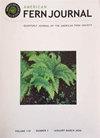The Scaly Tree Ferns Allied to Cyathea multiflora (Cyatheaceae) in Colombia and Neighboring Countries
IF 0.9
4区 生物学
Q4 PLANT SCIENCES
引用次数: 0
Abstract
Abstract. We present an update to our knowledge of the taxonomically challenging Cyathea multiflora-group. Several taxa can be reinstated and newly described thanks to extensive field studies in Colombia and bordering countries. Easily overlooked characters like minute hairs, laminar squamules, and size of indusia correlate with distinct physiognomies in the field. Cyathea multiflora in the strict sense is almost restricted to Mesoamerica, just reaching into the Colombian Darién region. We observe a geographic overlap of several species especially in the Darién-Chocó region (Cyathea hildegardis sp. nov., C. pinnula, C. pinnuloides sp. nov., C. retanae) and two wider-ranging species extending from Mesoamerica into the Andes (C. acutidens, C. pinnula). The reinstated C. columbiana and newly recognized C. uregoana sp. nov. and C. prosopioides sp. nov. are restricted to the Chocó, including the Ecuadorean Esmeraldas region. Frequently found in the northern Colombian Cordillera central is C. paisa sp. nov., which is intermediate between C. pinnuloides of the Darién-Chocó region and C. lindigii, a relatively large species widespread in the Cordillera Oriental and the eastern Andean slopes south to Bolivia. We retain C. acutidens and C. leucolepismata as distinct species that can also be readily distinguished in the field by their appearance and the shape of the entire leaves but can be difficult to differentiate as fragmentary specimens. Cyathea mariposana sp. nov., a trunkless species presumably more closely related to C. squamulosa, is described from Panama. Cyathea retanae is reported from Colombia. A lectotype is chosen for C. columbiana. All relevant species are illustrated and incorporated in a diagnostic key.哥伦比亚及其邻国与多花Cyathea (Cyatheaceae)同属的有鳞树蕨
摘要我们提出了一个更新的知识,我们的分类学挑战Cyathea multiflora-group。由于在哥伦比亚及其邻国进行了广泛的实地研究,一些分类群得以恢复和新描述。容易被忽视的特征,如微小的毛发、层流鳞片和工业的大小与该领域独特的地貌相关联。严格意义上的多花Cyathea multiflora几乎局限于中美洲,刚刚延伸到哥伦比亚的达里萨丹地区。我们观察到几个物种的地理重叠,特别是在Darién-Chocó地区(Cyathea hildegardis sp. nov., C. pinnula, C. pinnuloides sp. nov., C. retanae)和两个从中美洲延伸到安第斯山脉的更广泛的物种(C. acutdens, C. pinnula)。恢复的C. columbiana和新发现的C. uregoana sp. 11和C. prosopioides sp. 11仅限于Chocó,包括厄瓜多尔的Esmeraldas地区。经常在哥伦比亚北部科迪勒拉中部发现的是C. paisa sp. nov.,它介于Darién-Chocó地区的C. pinnuloides和C. lindigii之间,后者是一种相对较大的物种,广泛分布于科迪勒拉东部和安第斯山脉东部斜坡到玻利维亚南部。我们保留了C. acutdens和C. leucolepismata作为不同的物种,它们也可以很容易地在野外通过它们的外观和整个叶子的形状来区分,但作为碎片标本很难区分。Cyathea mariposana sp. nov.是一种无树干的物种,可能与C. squamulosa有更密切的关系,描述自巴拿马。据报道来自哥伦比亚。选择了一种选育型。所有相关的物种都被说明并纳入诊断关键。
本文章由计算机程序翻译,如有差异,请以英文原文为准。
求助全文
约1分钟内获得全文
求助全文
来源期刊

American Fern Journal
生物-植物科学
CiteScore
1.20
自引率
0.00%
发文量
28
审稿时长
6 months
期刊介绍:
The American Fern Journal is a peer-reviewed journal focused on the biology of ferns and lycophytes.
 求助内容:
求助内容: 应助结果提醒方式:
应助结果提醒方式:


